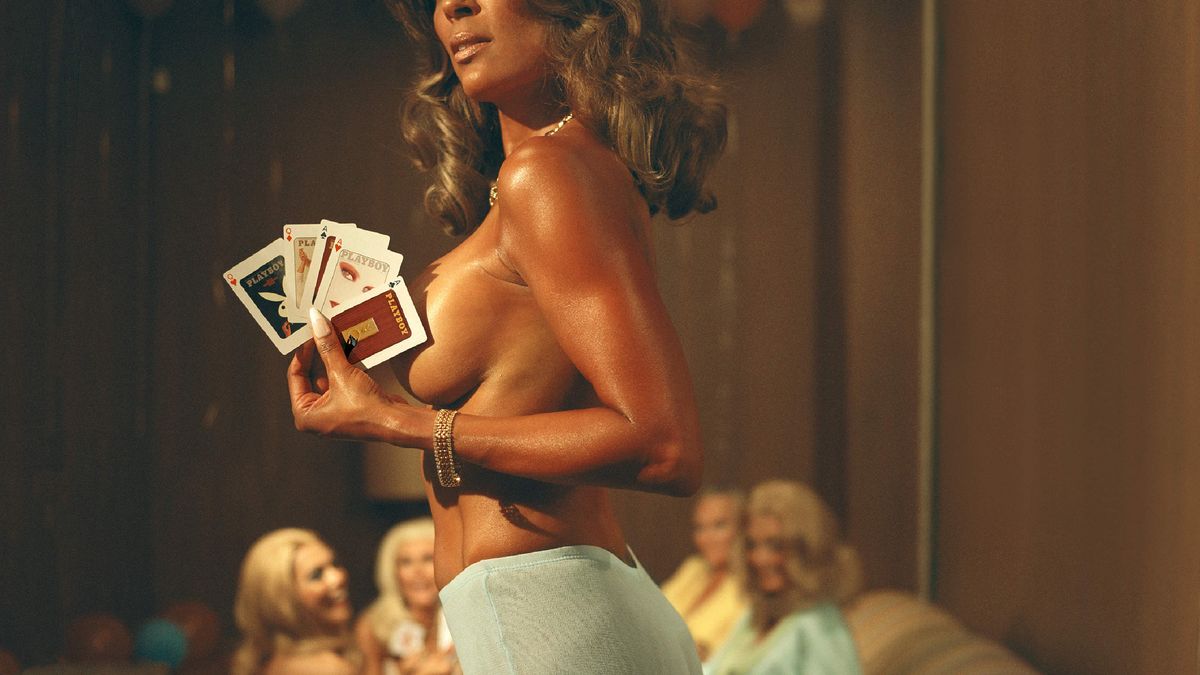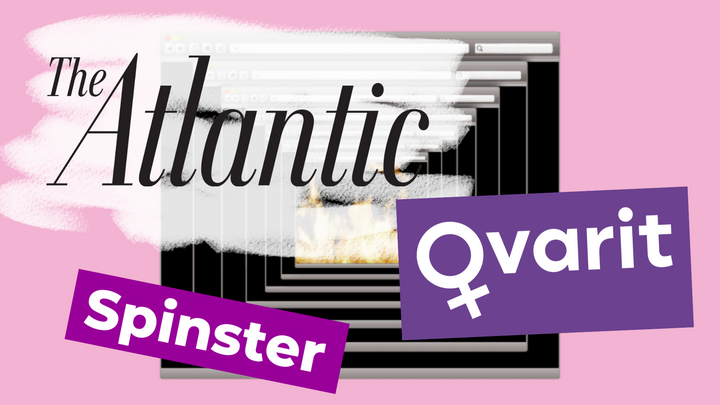Playboy's Equality Issue Is Everything Wrong With Liberal Feminism
The magazine displays zero self-awareness about how culture got to this point.

On December 17th, Playboy launched their first-ever "Equality Issue," featuring past Playmates from the 60s and 70s, interviews with feminist role models and change-makers, and a heavy-handed attempt to look progressive.
An introduction to the issue, titled "Once A Playmate, Always A Playmate" by Jamilah Lemieux sets the tone for what's to come:
"In 2020, the notion of sex positivity has found new enthusiasm among young women who believe true bodily autonomy means having the right to enjoy and participate in what was once written off as objectification. The present-day pinup is less concerned with how she appears before the male gaze than how she feels about herself. She no longer needs photographers and publications; she can direct her own shoots and post them on Instagram. Her modeling may be a rewarding hobby or a means of amassing an empire."
Playboy has been attempting to redefine itself as feminist, progressive, and empowering for a while now. The magazine's Summer 2019 issue featured an interview with #MeToo founder, Tarana Burke. Their staff includes a large number of women (compared to what you'd expect), and their goal is now to reach 50% female readership. According to The New York Times:
"It is edited by a millennial triumvirate: the openly gay Mr. Singh, 31; Erica Loewy, 26, the creative director; and Anna Wilson, 29, who oversees photography and multimedia. There had been women in the latter two positions before, but never both at the same time."
There's still nudity, but now the models are primarily shot by women. Hugh Hefner, and the entire Hefner family, is long gone. The family no longer maintains a financial stake in the magazine.
“The era of fuzzy dice and mud flaps is over,” said Rachel Webber, Chief Marketing Officer, to The New York Times in August.
December's Equality Issue is clearly attempting to drive this new brand image forward. The issue features three main attractions: a photoshoot with former Playmates, an interview with journalist Christiane Amanpour, and a profile of ousted California politician Katie Hill.
The message of the issue is peak liberal feminism: Playboy supports your right to be sexually objectified if you so desire, but they also think malicious objectification is wrong and holding women back from achieving equality in the workplace. They seem to think that by normalizing female objectification, they'll take the bite out of patriarchy. There is zero awareness, accountability, or self-criticism for the role that Playboy has historically played in making these issues worse.
When Lemieux writes that "sex positivity" of the past was previously written off as objectification, she's right. Feminists of the first and second waves correctly identified male objectification of women as deeply linked to the male violence they were fighting. This viewpoint may seem old-fashioned now, but radical feminists of today are still fighting to end sexual objectification. Liberal feminists, on the other hand, are doubling-down on it.
To justify Playboy's sordid past, Lemieux attempts to re-write history, painting Playboy models as progressive visionaries who paved the way for women's liberation. She argues that because the women appeared to enjoy their objectification and made money from it, that there is hardly any cultural critique to be made:
"Can you really take issue with pretty pictures of happy girls having fun? Is it really objectification if the object in question appears so deeply satisfied? Even objectification must be viewed, well, objectively. Yes, many men have enjoyed reducing us women to sexual fantasies or subjecting us to brief, lusty glares, but those men can’t parlay fantasies and glares into fame and fortune, can they?"
Feminists can (and should) examine the cultural impact of media on attitudes towards women, even if those women appear to enjoy their participation. Feminists should also be questioning the assumption that just because an activity was "freely" chosen, the choice was entirely uncoerced. Lemieux herself admits that fame and success were primary motivations of Playboy models. Under capitalism, especially in the 70s, women had few options to become independently successful or wealthy. If nude modeling presented that rare opportunity, that does mean the choice was uninfluenced by patriarchy. Patriarchy created the situation in the first place. Women, as always, are just doing what we need to play the game.
Lemieux's assertion that men do not benefit from this objectification is laughable, coming from Playboy--an empire built and owned, originally, by a single man on the backs (or breasts) of women. Further, men clearly do benefit from a culture of female objectification by an increase in sexual access to women. In fact, this has been the entire goal of the sex positivity movement--to increase male sexual access.
No longer are women shamed as "sluts" if we put out too early or often. Now, we are celebrated as liberated and empowered. While slut shaming was certainly always a tool of the patriarchy based on ridiculous double standards, sex positivity inevitably benefits men more than women. Now, women are shamed for being too prudish, too vanilla, too repressed if we attempt to deny men sex in whatever violent porn-fueled format they desire.
The issue's profile on Katie Hill, the California congresswoman who resigned after a scandal involving revenge-porn demonstrates a shocking lack of self-awareness for the part Playboy has played in creating this environment where women can be kicked out of public office because their nudes have been released.
Hill became the victim of a vengeful ex-husband who released nude photos of her and details about an affair with one of her staffers during their messy divorce. In the end, he won. She was pressured into resigning from her hard-fought seat in congress. As the first openly LGBT member in the California seat (Hill is bisexual), she had made major strides forward. Now, it seems these photos had undone that progress.
In the piece, Anita Little discusses the trend of revenge porn:
In Hill’s case, the photos were published without her consent or knowledge, but the average millennial would barely bat an eyelash at the willing exchange of such images—emphasis on willing. A 2017 study from the Cyber Civil Rights Initiative found that roughly one in eight participants had been either victims of or threatened with “nonconsensual pornography.”
Little's claims that the average millennial wouldn't be bothered by the taking and exchanging of such photos may be true--but if this is women's current reality, it's one that Playboy shaped. Playboy was at the forefront of normalizing porn, and its fight to be accepted into the mainstream paved the way for more hardcore porn to exist (even as Penthouse and Hustler drove Playboy's sales down). The exchanging of nude pictures between millennials, a burden which often falls on women (women receive unsolicited dick pics while men demand nudes) is a direct result of porn culture. If anything, Hill should be considered a descendant victim of Playboy itself, as is every other woman who has been pressured into taking nudes or had them leaked.
It's clear that while Playboy has normalized porn, female objectification, and hypersexualization, the fact that Hill could still be pressured out of office for leaked nudes demonstrates that the era of "sexual liberation" Playboy has ushered in is a farce.
The Equality Issue also invited back Victoria Valentino, a now 77-year-old former Playboy Playmate who featured in the September 1963 issue. Valentino was one of over 50 women to come forward with allegations against Bill Cosby, who she claims raped her in 1969. Playboy was not shy about using Valentino's #MeToo credentials to promote their agenda:
Women who’ve put their sexuality on display struggle to be recognized as legitimate victims of sexual violence. But Valentino expresses gratitude for having been “given this platform so I might use my voice for social good.”
Once again, Playboy fails to acknowledge its own role in creating this hostile environment for women which leads to victim blaming and women not being believed. The porn industry is intricately linked to violence against women, the sex trade, and attitudes among men which create rape culture. Hefner's Playboy didn't create patriarchy, but it did certainly repackage it in a way that could sell, helping violence against women become so normalized that now women are actually killed during sex and then we are told they "consented" to it. Playboy is happy to continue objectifying women, but now through a #woke new lens, without ever confronting how they have continued to the culture they claim to be critiquing.
That Hefner and the Playboy brand have been able to paint themselves as allies to women and feminists shows the failings of modern liberal feminism, which refuses to examine the root cause of women's oppression. Hefner himself declared feminists his enemy, stating, “What I’m interested in is the highly irrational, emotional, kookie [sic] trend that feminism has taken…these chicks are our natural enemy. It is time to do battle with them.” Playboy won that battle through psychological warfare, and now women are doing the patriarchy's bidding for it by promoting "sex positivity" which benefits men and harms women.
The generous support of our readers allows 4W to pay our all-female staff and over 50 writers across the globe for original articles and reporting you can’t find anywhere else. Like our work? Become a monthly donor!
Enter your email below to sign in or become a 4W member and join the conversation.
(Already did this? Try refreshing the page!)





Comments